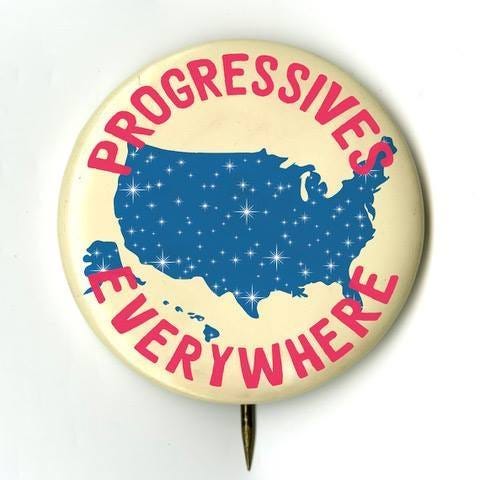What the voting rights failure reveals about us and where we go from here
The problem is deeper than two stubborn senators
Welcome to a Thursday evening edition of Progressives Everywhere!
After years of covering the battle over voting rights, Wednesday’s failure in the Senate was a profound disappointment, though not an unexpected one. The implications are vast, so I wanted to share with everyone some of my thoughts about how we got to this point and where we go from here.
The rest of the newsletter, with important news and headlines from across the country, will be for premium members, as is the Thursday evening custom.
Late Wednesday night, 52 US senators, including Democrats Kyrsten Sinema and Joe Manchin, voted to prioritize the filibuster over key voting rights legislation, thereby stomping on the last, best hope to secure free and fair elections for hundreds of millions of Americans.
The many justifications offered by the senators that voted to allow democracy to be curb-stomped by cowardly bigots were all illogical, cynical, and premised on outright lies, but this was never an issue that would be decided on the merits of the arguments presented by each side. The United States government doesn’t operate like that. This isn’t high school debate club, it’s war.
Policy is shaped by those people willing to exercise every tool at their disposal, and right now, even without technically controlling the federal government, the Republican Party has a monopoly on ruthlessness and willpower.
There were ways for Democrats to pass the voting rights bill without changing the chamber rules; they just would have required a patience and stamina that they just do not possess. But even getting to this point was avoidable.
They could have embraced the voting rights activists that protested in Arizona, West Virginia, and at the Capitol in DC all last year instead of ignoring them until December or telling them to “out-organize” voter suppression.
They could have held Kyrsten Sinema and Joe Manchin’s precious bipartisan infrastructure bill hostage until they agreed to pass voting rights. Instead, Biden caved and now Republicans who voted against the infrastructure bill get to tout all the money coming into their states anyway.
They could have mounted a campaign to expose and explain the new voter suppression laws and vicious gerrymanders. For the most part, they left that to lawyer and Twitter power user Marc Elias, especially after Texas’s suppression law was passed in the summer. I tried to fill in the gap, but no one was really paying attention.
What did Democrats do instead? They spent all fall fighting with one another over how much to spare pharmaceutical companies’ gross profits while touting their Bipartisan infrastructure bill whenever possible.
By making this a debate a legislative procedure, all meaning and urgency were stripped away. It became academic, the same as any other bill.
Joe Manchin claimed several times this week that no one was going to have their voting rights attacked or their voice silenced. While I have little faith in ol’ Joe’s ability to retain any new information, Democrats failed to frame this fight in necessarily urgent terms until the very end, and they never offered any real indication to the public of just how Republicans were rigging elections in plain sight. It felt like hysteria, with little context.

Worse, they spent months flogging their mediocre infrastructure agreement with Republicans whenever possible, issuing a steady stream of press releases desperately trying to psych voters up for future road work in their area. Democratic lawmakers making little tour stops to hype a bipartisan infrastructure deal does little to advance the argument that Republicans are democracy-hating racists dead set on effectively nullifying the concept of majority rule in favor of installing a theocratic regime.
The Uncanny Valley of Panic
In a sense, these can only be considered mistakes in hindsight, because up until the Build Back Better Act fell through, most Democrats showed little interest in pursuing the voting rights legislation with any real vigor. It took activists and smart donors, along with the failure of Biden’s economic agenda, to push them into making the last-minute effort. They are just not, by and large, equipped to fight a political or cultural war.
The voting rights fiasco was an abject political failure, but it was also a cultural one. Republicans and their right-wing allies have whipped their paranoia-friendly base into a frenzy by fostering the sense that some malevolent force is always just moments away from completing a full-on takeover of government, extinguishing their freedom, and subjecting them to a mandatory daily Black history lesson taught by trans Muslims.
Democrats, on the other hand, offer the voters they most value a rosier, antiseptic version of reality in which Team Blue is always fighting for their rights, evil is one subpoena away from being vanquished, and retweeting resistance accounts will make all the difference.
There is also an uncanny valley effect that hinders the effort to convince people that democracy truly is in existential danger and requires a mass, physical movement to protect it. The word “dictatorship” gets thrown around quite liberally, and quite fairly, but our narrow and outdated collective understanding of what those kinds of regimes look like makes it hard for people to understand the threat.
The four years of Trump’s presidency were terrifying, and we’re still in the midst of a viral plague that has killed 860,000 of the 69 million Americans it has infected, but for the most part, everyone is back to living some version of their lives. The apocalypse came and the most intense debate was over how little we should care and how few precautions we should take.
We still have our smartphones, we can still watch Netflix, and no matter who runs the government, the NBA playoffs are going to rule.
Hitler, Stalin, and Mao rounded people up by the millions and sent them to their deaths, a prospect still unthinkable here (unless you’re an undocumented immigrant or Black man, two groups whose fortunes are rarely considered by decision-makers or wannabe soothsaying pundits). Modern dictatorships are more insidious and allow for a sense of normalcy in everyday life. That’s what we’re facing now, a situation made even worse by our rearranged social circumstances.
Child poverty is about to spike again, but in such an atomized and isolated society, a donation to a GoFundMe or two assuage guilt about the things we can’t see. The rich have not had their taxes raised one cent. The national minimum wage is still $7.25 and schools are under attack.
Fundamentally, we have a mismatch between the people that are most politically engaged and influential and the people whose basic rights are at risk. Uprisings only happen when people have skin in the game, and right now, Democrats don’t have the coalition to force through populist progressive policies — we need to expand our reach to make sure politicians listen.
How do we turn this disaster around?
At More Perfect Union, I’ve been closely covering a strike of 8400+ grocery store workers in Colorado that have been mired in and around the poverty line for years while their employer, Kroger, has spent billions on stock buybacks. Most don’t have the energy to get politically involved, and not on their minds right now. Some form of this story is playing over and over again across the country, and in most cases, the workers don’t even have the right to strike.
We must a create party that truly speaks to the people that feel the most devastating effects of the calamities are to come. This can’t be a party of people warning about what will happen to others and politicians who feel no pressure to prevent those indignities and abuses. Joe Manchin felt comfortable killing paid leave, the child tax credit, and voting rights because working-class voters in West Virginia have become Republicans and may have punished him for voting for those things.
Yes, that would have been very much against their interests, but after years of passing free trade deals, aligning with corporations that outsource jobs, and breaking their promises, Democrats haven’t provided working-class voters any reason to trust them, allowing for Republicans to play on fears and cultural affinities.
We need to fight to elect Democrats willing to stand up to corporate lobbyists and divest their own personal portfolios, Democrats that not only keep their promises but go above and beyond them. And to do that, we need to engage with people that the party usually only gives lip service. We’ve got a long way to go — Colorado’s Democratic governor, Jared Polis, has not visited the picket lines at Kroger-owned King Soopers, where the 8400+ workers are protesting. Neither has Sen. John Hickenlooper. Neither man has even released a statement in support of the UFCW workers.
Warning of calamities doesn’t really work, it doesn’t spur a mass movement or mass action, when the only people listening to those warnings will be largely fine no matter what happens. Especially when that population is dwindling by the day. We have to demand more of our representatives and hold them accountable. Keep your eye on who does and does not support this legislation for an indication of which current lawmakers are willing to step up.
Keep reading with a 7-day free trial
Subscribe to Progress Report to keep reading this post and get 7 days of free access to the full post archives.





